10 Patient Testimonial Questions to Use as a Template
There are thousands of different things you want to ask your patients, but you don’t want to overburden them. Here at 10 testimonial questions to ask them that you can use to create a template for success.

OK, you know that gathering patient testimonials is an essential way to marketing your practice. They’re one of the best forms of proof. They show the world that the services you offer are as good as you say.
They help you establish an emotional connection with prospective clients before they’ve even walked through your doors for their first appointment. Just by using testimonials constantly, you’ll generate 62% more revenue.
Knowing the advantages of sourcing patient endorsements is awesome. Bonus points if you’ve reviewed what other healthcare organizations do with their testimonials.
However, in order to see any success from them, you’ll have to put in the work yourself. In other words, you have to reach out to your most loyal clients, get their OK, and ask them a series of questions that spur an authentic response.
If you haven’t started this process yet, it doesn’t mean you’re lazy. It more than likely means that you don’t know what questions to ask.
There are thousands of different things you want to ask your patients, but you don’t want to overburden them. They said they were willing to give you a testimonial, not write a novel about your practice.
Before diving in, understand that when you’re asking your testimonial questions they’re meant to help your participants gather their thoughts. It’s less of a questionnaire and more of a brainstorming tool. You need to make sure your participants understand this, otherwise, they may fill it out.
Nothing beneficial comes from going down that route.
A couple of things will happen as a result of sending your patients your testimonials as a questionnaire…
- It’ll look like you’re not putting much care into their opinions
- They’ll try to fill it out as fast as they can to get it over with
- You’ll receive a sheet filled with fragment sentences that are unusable
In other words, cutting corners when asking for patient testimonials leads to poor results.
You can’t show off how great your practice is with abbreviated sentences, doing so will look sloppy.
Furthermore, you can’t rewrite what they said, that’s illegal. When your patients give you their testimonial, that’s an endorsement. According to the Federal Trade Commission, endorsements need to reflect the honest opinions, findings, beliefs, or experiences of the endorser. The last thing you’d want to do is get into legal trouble just for trying to get the word out about how great you are.
So let’s get into it, here are 10 testimonial questions that you can use to create a template that ensures success.
1. Is it OK to share your testimonial publicly?
Start here.
Before you even dive into asking your patients questions, you need to get their OK. It’s obvious to both you and me that testimonials are for the public to see either as a flyer hanging up in your office, a landing page on your website or as an image on your social media. But that doesn’t mean that your patients are on the same page.
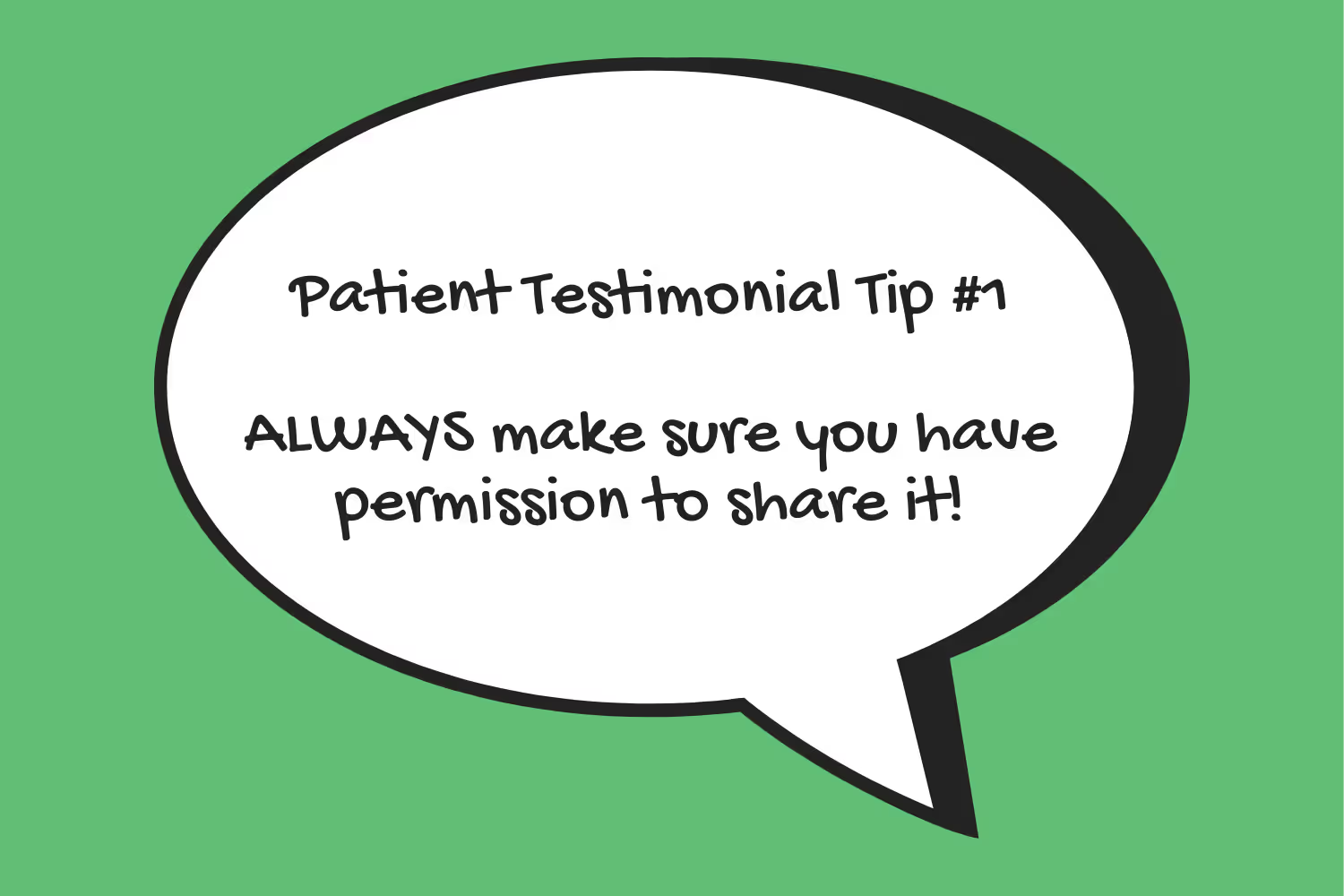
There’s also the fact that there are very specific rules we all have to abide by while working within the healthcare space. Of course, what I’m referring to is the Health Insurance Portability and Accountability Act (HIPAA). Like anything you do within healthcare, you’ll have to keep this regulation in mind while trying to source a testimonial from a patient.
It’s up to them what they’re comfortable with sharing. However, asking this question ahead of time ensures that they know you’re planning on sharing what they say with the public.
2. How did you find us?
When diving into the questions, you’ll first want to know the background story of how they found your practice.
Everyone will have a different story about how they found you or why they came to you. Their answer will help give some background for the future readers of their testimonial.
Even if the client was a referral, they’ll still have a story to tell.
This question also helps highlight your efforts in getting your brand out there. This patient might have searched on Google and found you. Or they liked the informational videos you uploaded on TikTok. Either way, this question is a must ask for this reason alone.
3. What were your past healthcare experiences like before switching to us?
This is the perfect follow-up question to ask after the second one. That’s because it builds off of it by diving into more specifics.
Maybe they switched to you because they wanted a more personable experience than what they had at the large healthcare organization up the street
Maybe they were looking online, found you on Google and decided to go to you because you were the next closest doctor to their house. That’s not a background story that’s going to keep future readers on the edge of their seats. But sometimes their response to this question won’t be the most riveting answer, that’s fine.
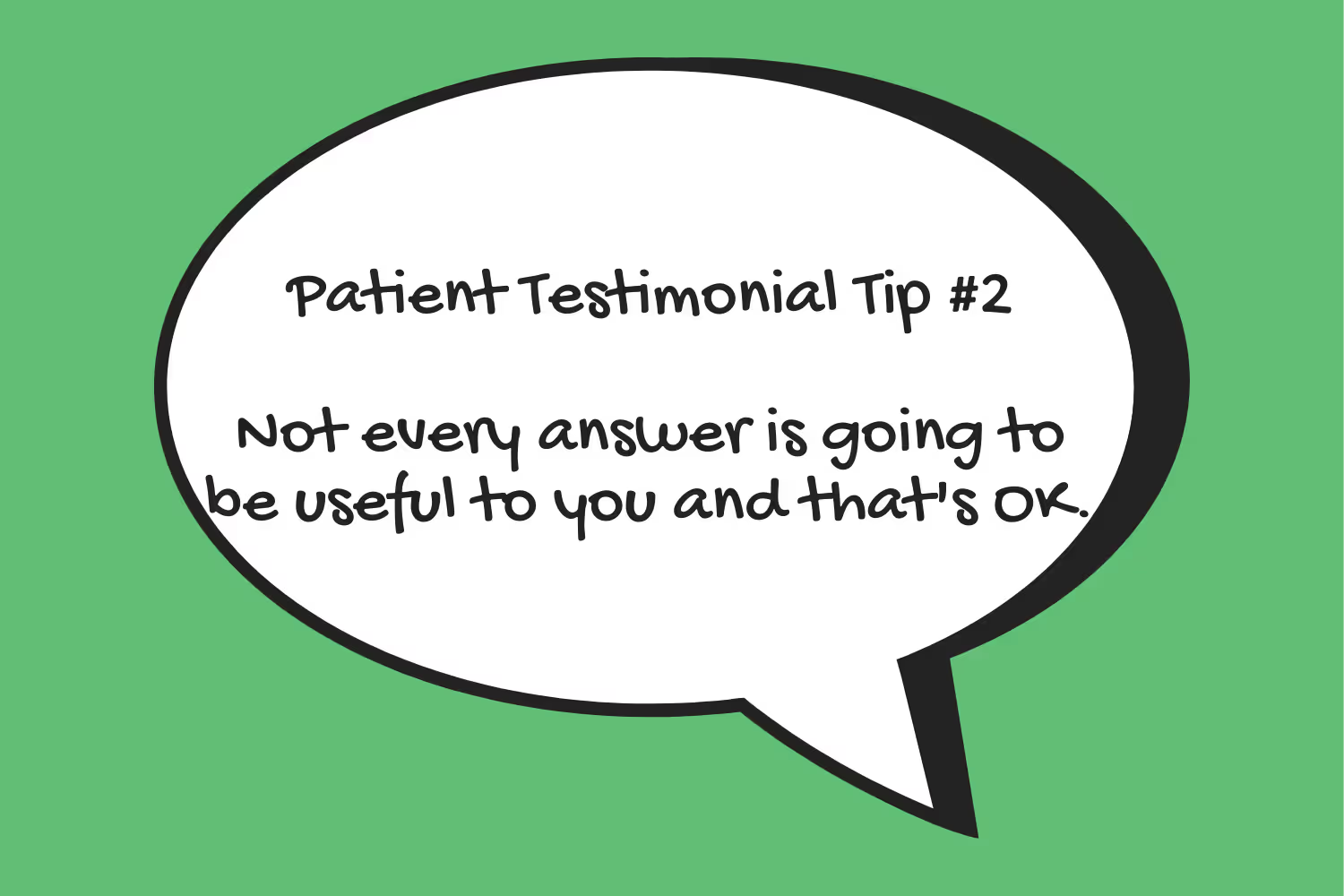
A lot of times the first couple of questions act as icebreakers. It’s possible that the patient you’re talking to could be a little anxious. That’s why this question exists, it forces them to be more specific by shifting the focus off of your practice and more on their own self-reflection.
In any case, it also further helps the interviewee get into the right mindset for everything else you’re going to ask them.
4. What stood out the most about us during your first appointment?
After they’ve had some time to think about what life was like before coming to you, it’s time to guide them through their experiences at your practice.
Specifically, start with their first impression.
As an organization, you had exactly 27 seconds to make a first impression on the person you’re trying to get a testimonial from. The fact that they’re willing to give you their opinion about you is a clear sign that you made a good impression on them.
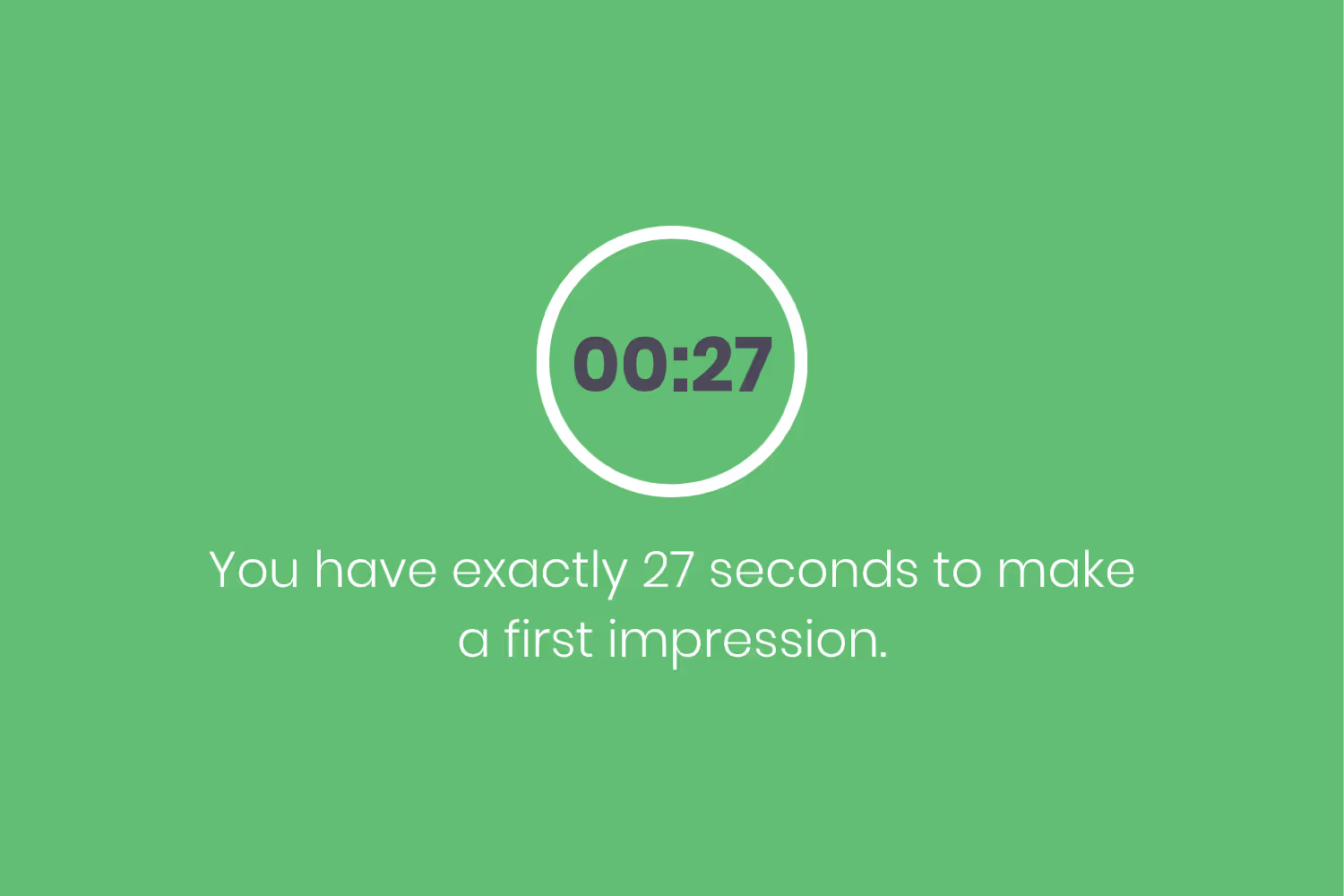
Maybe you have an awesome waiting room, killer patient experience, or great follow-up process. These are all the finer details of your organization that sets you apart from others. You’ll want prospective patients to know these so that they’ll be more likely to choose you as their new provider.
5. What was the obstacle that almost prevented you from choosing us as your provider?
Choosing a healthcare provider is not an easy decision. There are what seems like a thousand different obstacles that your patient more than likely faced before choosing you.
To that point, you might think that these shouldn’t be a touching point in a testimonial about your practice. After all, isn’t that shining a light on reasons why someone shouldn’t go with you?
The reality is that people already know all of the hurdles involved with selecting a new healthcare provider. So instead of shying away from that, ask them about the obstacles they faced.

Obviously, since they chose you they either…
- Overcame any hurdles because there weren’t that many
- Your experience is so great that it was worth any challenges they faced
- You helped them as much as possible to make it easier for them to switch
Any of those three options work out in your favor. The healthcare process isn’t streamlined, there’s a lot of red tape and clunky processes that go into it. Everyone already knows this, which is why it’s such a constantly hot topic.
But instead of running away from that fact, embrace it and show off. Even after everything involved in switching your clients still chose you. That’s a great story to tell.
6. What are the biggest factors that make you happy that you chose us?
They might’ve already hinted at the reason why they’re so happy that they chose you as their provider from question four. However, that question was from a high-level. This question dives into specifics.
Sure, they already mentioned that they like that you send them a handwritten thank you letter after every appointment. But did they go into detail about why the like it so much? Did they describe how it’s unique to any other doctor they’ve visited before?
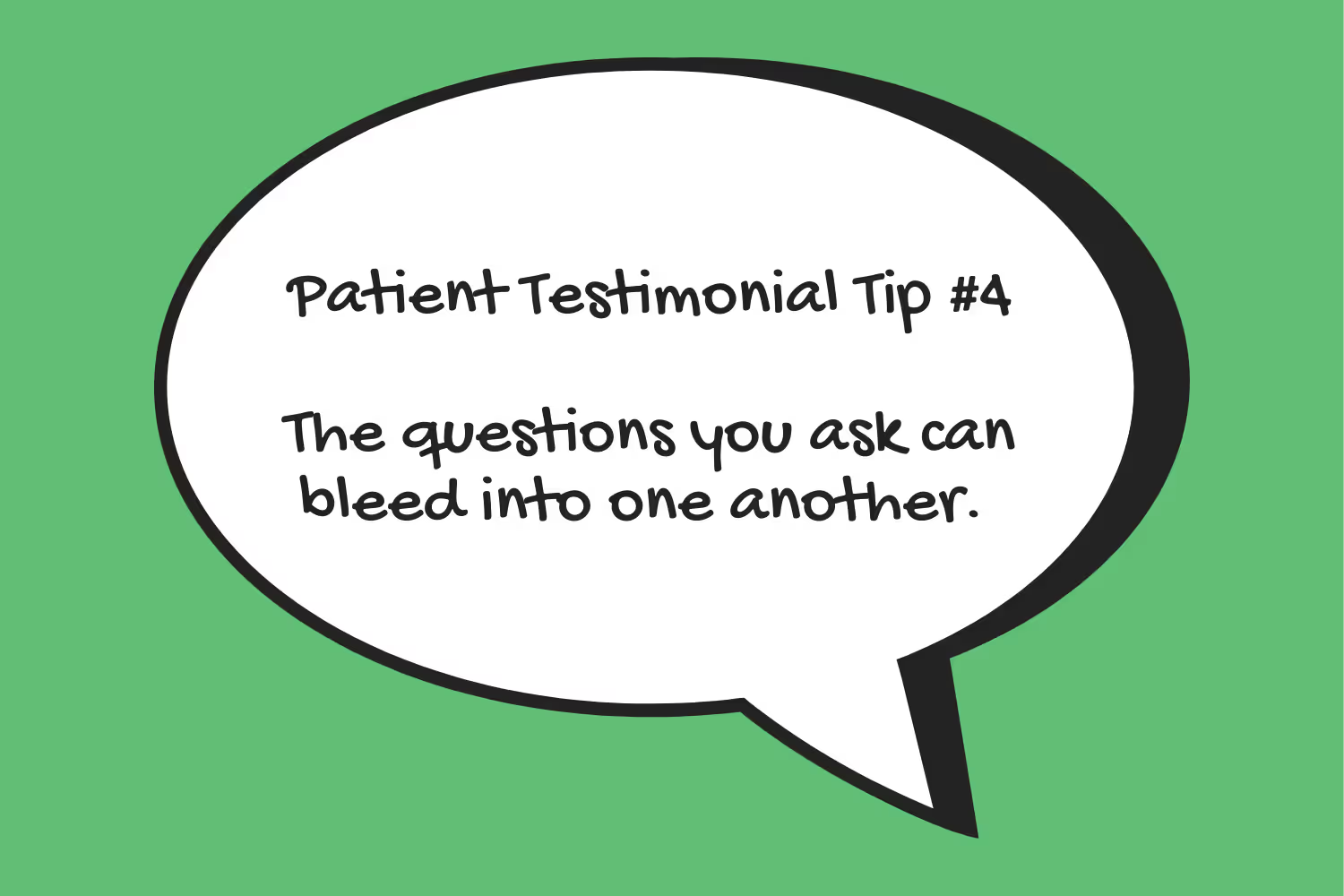
Maybe they already did in one of the previous answers, that’s fantastic. If that’s the case, ask them if there’s another factor that they enjoy about having you as their doctor. There’s more than likely other reasons.
7. How has your life changed since we've been our primaryu healthcare provider?
OK, this question sounds a little over the top.
Let’s say you’re a sports medicine doctor and 85% of your appointments are physicals. As a result, the patients you’re asking this question might not experience anything “life-changing” when they come in for an appointment with you.
If that’s the case, 15% of your other patients came to you for something a little more serious. Thus, they’d be able to easily answer a question like this one.
The point I’m trying to make is that the questions you ask your patients should change based on why they come to you. Furthermore, just because you ask them a question doesn’t mean they’re required to answer it.

Another universal truth about healthcare is that it’s highly personal. The information and data you deal with on a daily basis as a doctor is sensitive and protected by law. That means that if your patient doesn’t feel comfortable answering a question you ask them in order to get a testimonial from them, that’s OK.
That also stands true if they share something with you and have second thoughts about letting you share what they answered publically. If they made this request and you still published their testimonial publicly, you may then face a HIPAA violation.
8. What are the main reasons why you'd recommend us to other patients?
The bottom line is that you’re asking your clients for testimonials in order to get a higher volume. There’s no shame in admitting that.
This question is unique to all the others in that it accomplishes two things.
First, the obvious one is that it will give you an honest, upfront answer. Which happens to be what prospective patients want in their modern healthcare provider.
Second, it indirectly convinces the patient you’re asking this question to recommend you to people that they know. In-person recommendations by your patients to their friends is one of the best word-of-mouth marketing strategies for your practice.
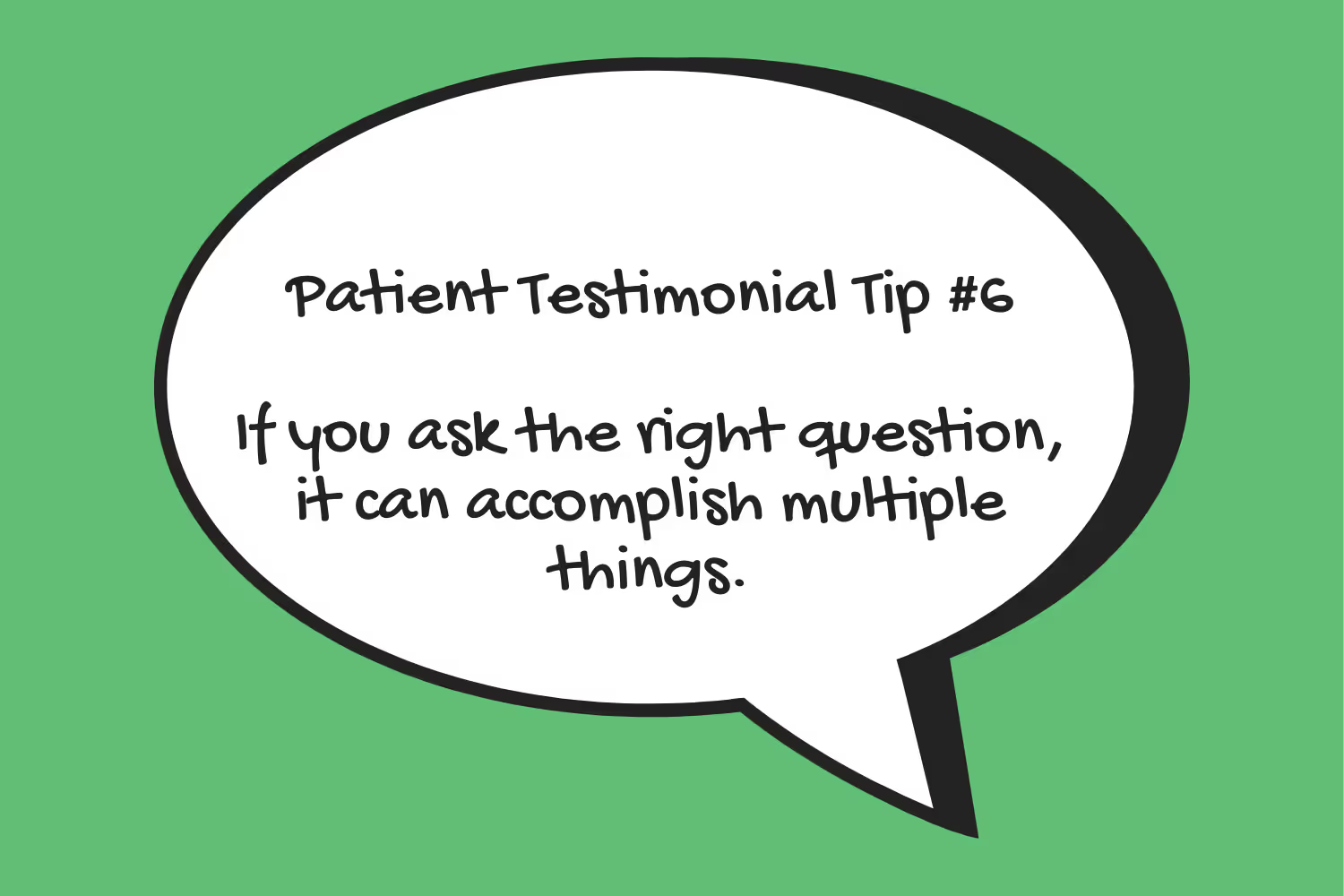
9. What surprised you most about our practice?
Switching healthcare providers is not an easy task. So when the patient switched to you, they had a particular goal in mind when they first came to you. If they’ve stayed with you for a while, you’ve helped them accomplish that goal.
However, many modern practices also offer extra perks as a means to show appreciation. To be blunt, I’m talking about patient loyalty programs or rewards for the continual support of your organization.

At the end of the day, the quality of care that you provide is by far the largest factor in swaying a new client to switch to you. But these surprises will go a long way in boosting the perception of your organization and that’s what this question captures.
10. Is there anything we could do to improve our patient care and/or experience?
As you’re winding down this process, you can use it as an opportunity to improve your practice.
This means turning the questions on yourself and asking if there’s anything they think your organization could improve upon. It gives the patient to open up further about the experiences they’ve had.
In return, you’ll receive feedback you might not have thought about from a direct, truthful source.
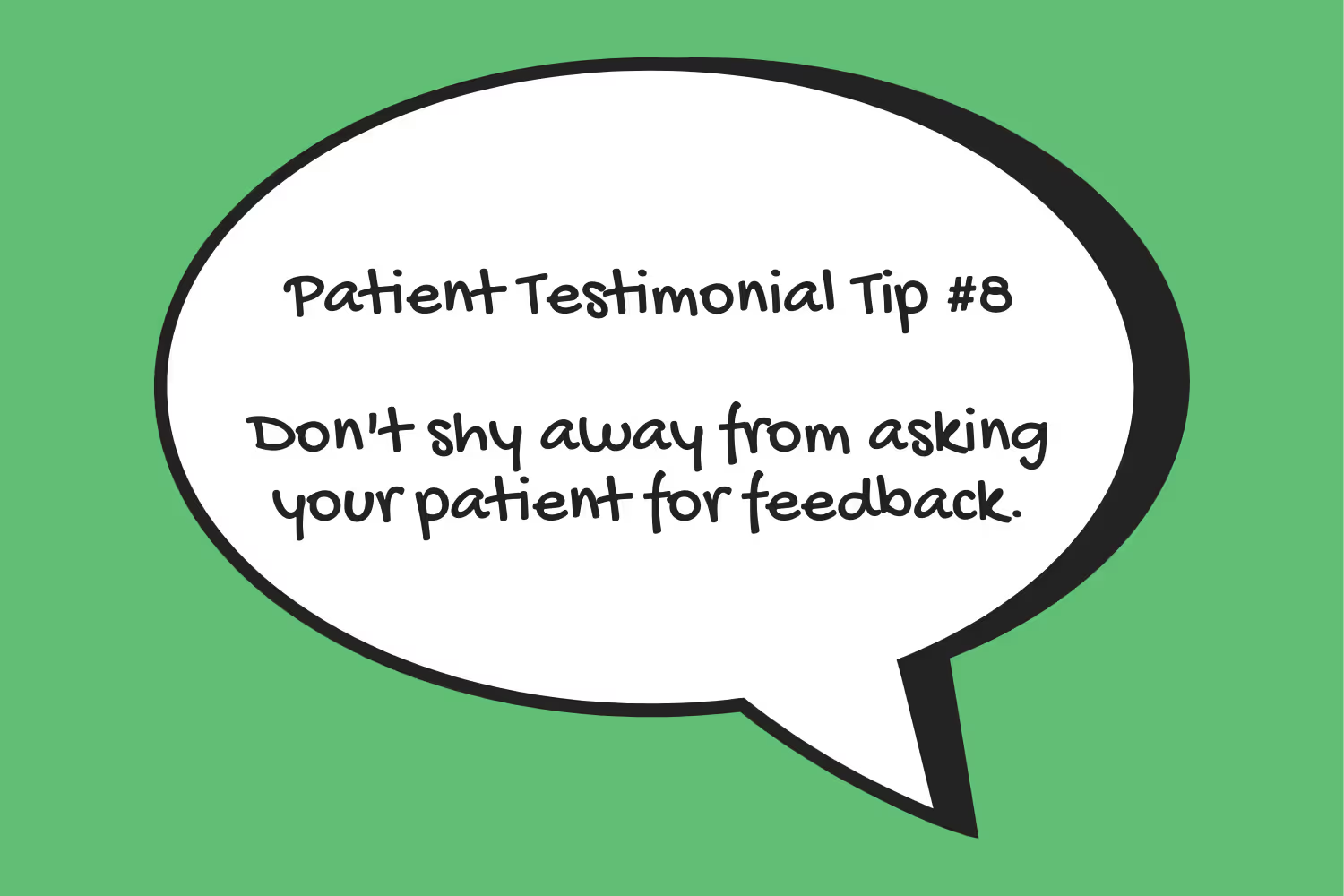
It’s important to note that you don’t have to add their response to this question as a part of their testimonial.
If you do, though, it could further enhance the perception that prospective prospects have on you that you’re an up-front and honest practice.
However, if you’re not planning to add their answer to this question, let them know that before they answer it. If you could face two different scenarios…
- They may feel like you’re setting them up to look bad
- They might hold back their answer since they feel under the magnifying glass
By letting them know whether or not you’re going to use their answer ahead of time, you’re taking off a lot of the pressures that come with a question that’s asking for criticism.
Conclusion
If you’ve noticed, many of these questions bleed into one another. That’s by design. In order to get the most out of the client you’re interviewing, you’ll need to ask the same questions in different ways. That way you’ll jog their memory and get different perspectives on their opinion.
At the end of the day, what you ask in order to get a testimonial is up to you. To that point, you don’t need to bring up all of the questions listed within this blog post either.
Each one of your clients is different.
So tailor your testimonial interview process around them. Use the questions within this blog post as a template to help guide you along the way. That way you’ll ensure quality responses while covering all of your bases from a HIPAA compliance standpoint.
Emphasize your product's unique features or benefits to differentiate it from competitors
In nec dictum adipiscing pharetra enim etiam scelerisque dolor purus ipsum egestas cursus vulputate arcu egestas ut eu sed mollis consectetur mattis pharetra curabitur et maecenas in mattis fames consectetur ipsum quis risus mauris aliquam ornare nisl purus at ipsum nulla accumsan consectetur vestibulum suspendisse aliquam condimentum scelerisque lacinia pellentesque vestibulum condimentum turpis ligula pharetra dictum sapien facilisis sapien at sagittis et cursus congue.
- Pharetra curabitur et maecenas in mattis fames consectetur ipsum quis risus.
- Justo urna nisi auctor consequat consectetur dolor lectus blandit.
- Eget egestas volutpat lacinia vestibulum vitae mattis hendrerit.
- Ornare elit odio tellus orci bibendum dictum id sem congue enim amet diam.
Incorporate statistics or specific numbers to highlight the effectiveness or popularity of your offering
Convallis pellentesque ullamcorper sapien sed tristique fermentum proin amet quam tincidunt feugiat vitae neque quisque odio ut pellentesque ac mauris eget lectus. Pretium arcu turpis lacus sapien sit at eu sapien duis magna nunc nibh nam non ut nibh ultrices ultrices elementum egestas enim nisl sed cursus pellentesque sit dignissim enim euismod sit et convallis sed pelis viverra quam at nisl sit pharetra enim nisl nec vestibulum posuere in volutpat sed blandit neque risus.

Use time-sensitive language to encourage immediate action, such as "Limited Time Offer
Feugiat vitae neque quisque odio ut pellentesque ac mauris eget lectus. Pretium arcu turpis lacus sapien sit at eu sapien duis magna nunc nibh nam non ut nibh ultrices ultrices elementum egestas enim nisl sed cursus pellentesque sit dignissim enim euismod sit et convallis sed pelis viverra quam at nisl sit pharetra enim nisl nec vestibulum posuere in volutpat sed blandit neque risus.
- Pharetra curabitur et maecenas in mattis fames consectetur ipsum quis risus.
- Justo urna nisi auctor consequat consectetur dolor lectus blandit.
- Eget egestas volutpat lacinia vestibulum vitae mattis hendrerit.
- Ornare elit odio tellus orci bibendum dictum id sem congue enim amet diam.
Address customer pain points directly by showing how your product solves their problems
Feugiat vitae neque quisque odio ut pellentesque ac mauris eget lectus. Pretium arcu turpis lacus sapien sit at eu sapien duis magna nunc nibh nam non ut nibh ultrices ultrices elementum egestas enim nisl sed cursus pellentesque sit dignissim enim euismod sit et convallis sed pelis viverra quam at nisl sit pharetra enim nisl nec vestibulum posuere in volutpat sed blandit neque risus.
Vel etiam vel amet aenean eget in habitasse nunc duis tellus sem turpis risus aliquam ac volutpat tellus eu faucibus ullamcorper.
Tailor titles to your ideal customer segment using phrases like "Designed for Busy Professionals
Sed pretium id nibh id sit felis vitae volutpat volutpat adipiscing at sodales neque lectus mi phasellus commodo at elit suspendisse ornare faucibus lectus purus viverra in nec aliquet commodo et sed sed nisi tempor mi pellentesque arcu viverra pretium duis enim vulputate dignissim etiam ultrices vitae neque urna proin nibh diam turpis augue lacus.


.avif)

